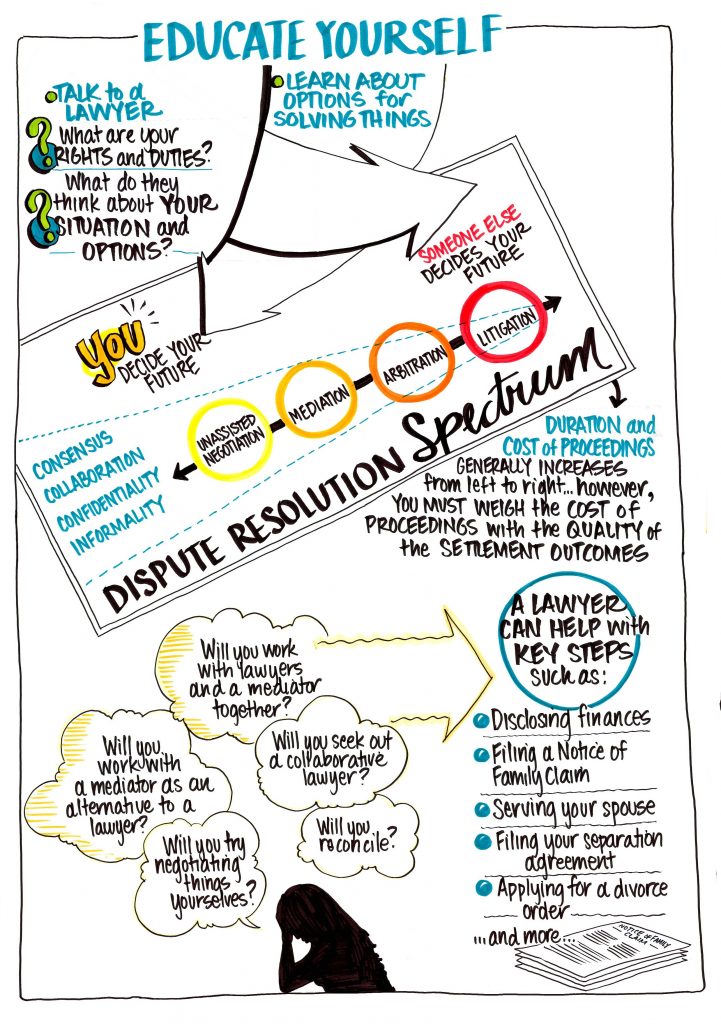In an effort to create an open and informative dialogue about mediation for participants, Christine Murray and Lisa Arora have come together to create a unique 12-part blog series that combines their insights into a comprehensive view of mediation.

Christine Murray practices exclusively in the area of family law and has extensive experience in negotiation, mediation, and litigation. She has acted as counsel for parties at countless mediations and has taught family law as an Adjunct Professor at the Peter Allard School of Law (University of British Columbia).
Lisa Arora is an internationally recognized expert in the field of graphic facilitation and a comprehensive family mediator who uses visuals to enhance communication and foster productive, mutually beneficial agreements during mediation.
The intention of this series is to provide answers to questions that people considering family mediation often ask themselves while evaluating the legal, emotional, and practical aspects of working with a mediator versus other options available to families facing conflict, separation, or divorce.
Do I Need to Bring a Lawyer to Mediation?
As you start to work through your divorce or separation in mediation, you might examine your option to also work with a lawyer during the process.
First of all, is it necessary or acceptable to hire a lawyer when you’re already working with a mediator (and is it a good idea)? If so, can your lawyer participate directly in your mediation sessions? What if you hire a lawyer, but prefer to attend mediation sessions without them present?
 The short answer is … IT’S UP TO YOU. Certainly lawyers may be present with parties in a mediation, however, it’s not a requirement that you have one there. You and the other party both get to decide for yourselves whether to work with a lawyer, and if you do, you will be able to decide how involved their role will be.
The short answer is … IT’S UP TO YOU. Certainly lawyers may be present with parties in a mediation, however, it’s not a requirement that you have one there. You and the other party both get to decide for yourselves whether to work with a lawyer, and if you do, you will be able to decide how involved their role will be.
Note: Sometimes other support people such as family members or other professionals can also be present during a mediation. These people have a limited role in the sessions, and all parties must consent to their participation.
Basically, there are three ways parties conduct mediation with lawyer involvement:
- Sometimes both parties bring lawyers.
- Other times, only one party brings a lawyer.
- And many times, both parties mediate without lawyers present (but seek legal advice – see below).
In instances where only one party has legal representation, a mediator will consider whether this factor creates a power imbalance and will design the mediation process with that factor in mind.
At minimum, whether you bring a lawyer to mediation or not, it is always recommended that both parties seek independent legal advice to educate themselves about their rights and responsibilities. This should be done both before starting mediation, and again afterwards, prior to signing any agreement.

With a spectrum of possible degrees of lawyer involvement, how do you decide what’s right for you?
Every situation is different, and there are lots of factors to consider. You’ll have to consider your own particular circumstances and several factors. Rather than basing your choice on any one factor, consider them all together. In your circumstance, which factor(s) carry the most weight?
- Finances – Can you afford to retain a lawyer for the mediation as well as pay your share for a mediator? Hourly fees for mediators and lawyers can vary significantly. Typically, fees for your lawyer are your responsibility, and mediator costs are split equally between parties. How can you best allocate your financial resources in the bigger picture of your divorce process? Are there arrangements that need to be made, such as an interim distribution of property, that would allow you to afford legal counsel
- Complexity of issues to resolve – How complex is your situation? How well do you know your responsibilities and entitlements? What are the issues? Are there some matters such as parenting planning that you feel comfortable handling on your own? Are there others, like spousal support or excluded property that you would be more comfortable deciding with a lawyer present? How confident are you in your ability to advocate for yourself?
- Collaboration – How willing of a participant is the other party? How motivated are they to come to an agreement through mediation? What is the other person’s conflict style? How will you feel if he/she brings a lawyer and you do not?
If you make the decision to hire a lawyer, ask yourself these questions about your representation:
- How collaborative is your lawyer?
- Is your attorney more settlement-focused, or do they promote going to court/litigation?
- What is your attorney’s view of mediation?
- How dedicated is your lawyer to you getting a good result outside of court?
- Does your lawyer approach mediation as only a stopover or discovery opportunity on the way to court?
One way to think through your decision is to ask your lawyer about the benefits of settling in mediation. If they respond with something like, “Well, avoiding a 5-day trial can save you a whole lot of money and stress. If you settle, maybe you can use the money to treat the kids with a Disneyland vacation instead,” you’ll know they’re putting your interests first.
Note: It’s important to remember that the mediator can’t advocate for you, and while they can share legal information, they cannot provide legal advice. That can only come from a licensed attorney.
If you’re still not sure about your decision, here are some observations we’ve made that might be helpful to think about.
Without a lawyer in mediation some benefits include:
- You have one less immediate cost;
- It’s easier to schedule mediation dates because there are fewer parties to coordinate;
- The mediation generally takes on a less formal tone;
- Working with fewer parties allows more direct communication and less opportunity for misunderstanding;
- If you and your spouse can communicate directly and work things out in mediation, you have an opportunity to strengthen communication between the two of you. This can be a confidence builder because you’ll have the experience to draw on when working things out in future;
- You might achieve more flexibility in problem solving by taking less of a legal stance on your situation;
- You can still gain access to legal advice during the process. For example, you might consult with a lawyer between multiple mediation sessions, you and the other party might agree on matters subject to legal advice, or you may reserve certain issues to be discussed only with an attorney present.
- You still have the power to adjourn your mediation and secure legal counsel if you decide you’re in over your head (Note: it is imperative that you do this before signing agreements);
- If you are not successful in mediation, the process will have been conducted without prejudice, which means it can’t be used in court. At that point, you can decide on taking next steps with or without the help of a lawyer.
With a lawyer in mediation some benefits include:
- You have someone to accompany you to mediation sessions, likely who will have experience from participating in many previous mediations;
- There is another person who can help set a positive and productive tone in the mediation;
- You have someone to help advocate for you;
- Your legal counsel will be responsible for bringing and organizing all of your documents;
- There is someone to help you keep your emotions in check during a charged situation;
- You have an objective person who can hold the bigger picture in mind and depersonalize things during the mediation process;
- Your counsel can help you feel safe and supported;
- There is instant access to legal information and advice about matters you might not be aware of (for example, tax implications);
- If you work with an experienced lawyer, they will have many previous situations they can draw from to help can suggest creative solutions;
- You have someone who can provide a point of view on the mediator’s performance;
- Your legal counsel will help you evaluate offers and proposals that are put forward for you to consider;
- There is someone who can help ensure that the agreements you come to are properly recorded;
- It is possible to limit your attorney’s role to participate in only one portion of the mediation.
- You have someone who’s staying up to speed on your situation and can, if you fail to resolve all your issues in mediation, give you advice on what steps to take next;
- You can potentially be more efficient in coming to a resolution as you do not have to break to get legal advice and re-schedule the mediation for a separate session.
Take care to realize that while there can be lots of value in bringing a lawyer to mediation, they could have an inherent conflict of interest when it comes to making a settlement. Unfortunately, some lawyers may see a successful mediation as lost revenue in trial. Others see successful mediation as an opportunity to help your family reach a positive and cost effective resolution while making their time available to help other clients.
It may feel daunting to make the decision about how much to involve a lawyer in your mediation, but know that if you later feel you want to change your approach, you can. There is the possibility to re-negotiate the parties to your mediation partway through the process. Because mediation is voluntary—as long as you have not signed off on any agreements—you can stop the process at anytime to re-group and figure out what next steps you want to take.
If you have more questions about how to decide whether you should secure legal counsel for your mediation, or if you want information on visual mediation, contact us at http://lisaarora.com/contact/
Important: Please note that this blog series is written in the context of providing information about family mediation and is not intended as legal advice. We recommend you seek legal counsel before making any major decisions about your personal legal circumstances, separation or divorce.


This has definitely been an interesting read to the pros and cons of bringing a lawyer to a mediation. Personally, I believe it’s always wise to bring a lawyer to a mediation. Like you stated, having an objective person who can keep your emotions in check while also seeing things from a different perspective is incredibly valuable. Not only would there be someone who can keep a level head, but you are also receiving counsel from someone who is an expert regarding the law and mediation. I feel like that’s an invaluable asset to have.
My friend is going to go through mediation soon and she has been wondering if she should get a lawyer to go with her. That is good to know that it is up to her if she wants one present with her or not! I like how you mentioned, that if only one party brings a lawyer they will consider this a factor of imbalance and will design the mediation process with that factor in mind. I will have to let my friend know. Thank you for the information!